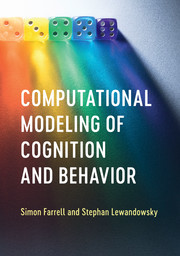
-
Select format
-
- Publisher:
- Cambridge University Press
- Publication date:
- February 2018
- February 2018
- ISBN:
- 9781316272503
- 9781107109995
- 9781107525610
- Dimensions:
- (247 x 174 mm)
- Weight & Pages:
- 1.1kg, 482 Pages
- Dimensions:
- (247 x 174 mm)
- Weight & Pages:
- 0.97kg, 482 Pages
You may already have access via personal or institutional login
Book description
Computational modeling is now ubiquitous in psychology, and researchers who are not modelers may find it increasingly difficult to follow the theoretical developments in their field. This book presents an integrated framework for the development and application of models in psychology and related disciplines. Researchers and students are given the knowledge and tools to interpret models published in their area, as well as to develop, fit, and test their own models. Both the development of models and key features of any model are covered, as are the applications of models in a variety of domains across the behavioural sciences. A number of chapters are devoted to fitting models using maximum likelihood and Bayesian estimation, including fitting hierarchical and mixture models. Model comparison is described as a core philosophy of scientific inference, and the use of models to understand theories and advance scientific discourse is explained.
Reviews
'I shudder to think about the time I could have saved had this book been available earlier. This educational masterpiece presents classic insights, modern methods, concrete examples, and expert advice; it should be required reading for anybody who seeks to understand human cognition and behavior.'
Eric-Jan Wagenmakers - Universiteit van Amsterdam
‘This timely book is a must-read for every aspiring student of cognitive modeling. It provides a comprehensive and in-depth coverage of the conceptual and practical foundations of computational cognition, for the beginner and the experienced reader alike. The art of applying all major modeling frameworks, including Bayesian, frequentist, and neural networks, is explained in a most lucid and accessible manner.'
Jay Myung - Ohio State University
‘An extraordinary achievement: the authors guide the reader from simple ideas about the nature of science to detailed, but lucidly explained, computer models of human behaviour. Associated statistical methods are comprehensively discussed. A pleasure to read.'
Philip T. Smith - University of Reading
'Farrell and Lewandowsky have succeeded in their ambition of spanning introductory to cutting-edge material. This book, and a willingness to dive in and learn by doing the exercises provided, is all that undergraduate and graduate students, and even established researchers, need to become a cognitive modeller.'
Andrew Heathcote - University of Tasmania, Australia
'Whether you are just setting out on your journey into computational modelling or whether you need to update your skills to incorporate newer and more coherent current practices, Farrell and Lewandowsky's book is likely to earn its place on your bookshelf.'
Tom Hartley Source: Quarterly Journal of Experimental Psychology
Contents
Metrics
Altmetric attention score
Full text views
Full text views help Loading metrics...
Loading metrics...
* Views captured on Cambridge Core between #date#. This data will be updated every 24 hours.
Usage data cannot currently be displayed.
Accessibility standard: Unknown
Why this information is here
This section outlines the accessibility features of this content - including support for screen readers, full keyboard navigation and high-contrast display options. This may not be relevant for you.
Accessibility Information
Accessibility compliance for the PDF of this book is currently unknown and may be updated in the future.


